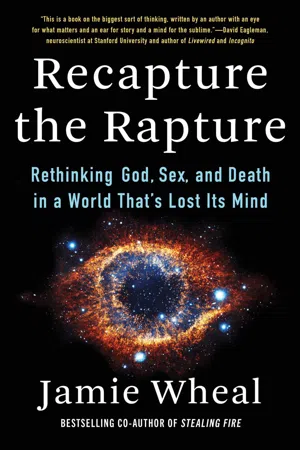
Recapture the Rapture
Rethinking God, Sex, and Death in a World That’s Lost Its Mind
- 304 pages
- English
- ePUB (mobile friendly)
- Available on iOS & Android
About this book
“A highly personal, richly informed and culturally
wide-ranging meditation on the loss of meaning in our times and on pathways to
rediscovering it.” —Gabor Maté, MD, author of In The Realm of Hungry Ghosts:
Close Encounters With Addiction
A neuroanthropologist maps out a revolutionary new practice—Hedonic Engineering—that combines the best of neuroscience and optimal psychology. It’s an intensive program of breathing, movement, and sexuality that mends trauma, heightens inspiration and tightens connections—helping us wake up, grow up, and show up for a world that needs us all.
This is a book about a big
idea. And the idea is this: Slowly over the past few decades, and now suddenly,
all at once, we’re suffering from a collapse in Meaning. Fundamentalism and
nihilism are filling that vacuum, with consequences that affect us all. In a
world that needs us at our best, diseases of despair, tribalism, and disaster
fatigue are leaving us at our worst.
It’s vital that we regain
control of the stories we’re telling because they are shaping the future we’re
creating. To do that, we have to remember our deepest inspiration, heal our
pain and apathy, and connect to each other like never before. If we can do
that, we’ve got a shot at solving the big problems we face. And if we
can’t? Well, the dustbin of history has swallowed civilizations older and
fancier than ours.
This book is divided into
three parts. The first, Choose Your Own Apocalypse, takes a look at
our current Meaning Crisis--where we are today, why it’s so hard to make
sense of the world, what might be coming next, and what to do about it. It also
makes a case that many of our efforts to cope, whether anxiety and denial, or
tribalism and identity politics, are likely making things worse.
The middle section, The
Alchemist Cookbook, applies the creative firm IDEO’s design thinking
to the Meaning Crisis. This is where the book gets hands on--taking a look at
the strongest evolutionary drivers that can bring about inspiration, healing,
and connection. From breathing, to movement, sexuality, music, and
substances--these are the everyday tools to help us wake up, grow up, and show
up. AKA--how to blow yourself sky high with household materials. And the best
part? They’re accessible, by anyone anywhere, no middleman required.
Transcendence democratized.
The final third of the
book, Ethical Cult Building, focuses on the tricky nature of
putting these kinds of experiences into gear and into culture—because, anytime
in the past when we’ve figured out combinations of peak states and deep
healing, we’ve almost always ended up with problematic culty communities.
Playing with fire has left a lot of people burned. This section lays out a
roadmap for sparking a thousand fires around the world--each one unique and
tailored to the needs and values of its participants. Think of it as an
open-source toolkit for building ethical culture.
In Recapture the
Rapture, we’re taking radical research out of the extremes and applying it
to the mainstream--to the broader social problem of healing, believing, and
belonging. It’s providing answers to the questions we face: how to replace
blind faith with direct experience, how to move from broken to whole, and how
to cure isolation with connection. Said even more plainly, it shows us how to
revitalize our bodies, boost our creativity, rekindle our relationships, and
answer once and for all the questions of why we are here and what do we
do now?
In a world that needs the best
of us from the rest of us, this is a book that shows us how to get it done.
Frequently asked questions
- Essential is ideal for learners and professionals who enjoy exploring a wide range of subjects. Access the Essential Library with 800,000+ trusted titles and best-sellers across business, personal growth, and the humanities. Includes unlimited reading time and Standard Read Aloud voice.
- Complete: Perfect for advanced learners and researchers needing full, unrestricted access. Unlock 1.4M+ books across hundreds of subjects, including academic and specialized titles. The Complete Plan also includes advanced features like Premium Read Aloud and Research Assistant.
Please note we cannot support devices running on iOS 13 and Android 7 or earlier. Learn more about using the app.
Information
Part I
Choose Your Own Apocalypse
A Cinderella Story



Table of contents
- Dedication
- Epigraph
- Contents
- Introduction: Doomsday Preppers
- Part I: Choose Your Own Apocalypse
- Chapter 1: The Centre Cannot Hold
- Chapter 2: Stop Making Sense
- Chapter 3: We Are the World
- Chapter 4: Designing Meaning 3.0
- Part II: The Alchemist Cookbook
- Chapter 5: Respiration
- Chapter 6: Embodiment
- Chapter 7: Music
- Chapter 8: Sacraments
- Chapter 9: Sex, Part I
- Chapter 10: Sex, Part II
- Chapter 11: An Immodest Proposal
- Part III: Ethical Cult Building
- Chapter 12: Everybody Worships
- Chapter 13: The Ethical Cult(ure) Toolbox
- Chapter 14: Team Omega
- Chapter 15: Pondering the Yonder
- Conclusion: The Four Horsemen Cometh
- Announcement
- Acknowledgments
- Glossary
- Appendix: Sexual Yoga of Becoming Study
- Index
- About the Author
- Also by Jamie Wheal
- Copyright
- About the Publisher